By Daphne Lye, CFP®
Senior Lead, Solutions, Research & Investment, MoneyOwl
From June 2025, those who wish to apply for credit cards from the three local banks will be able to use their CPF LIFE payouts as proof of income.
This follows the updated guidance from the Monetary Authority of Singapore, which allows banks to recognise CPF Life payouts as valid income when assessing credit applications.
Move may only benefit small group
While some cheer this move which gives retirees fair access to credit and their accompanying privileges, the group of retirees who would rely on CPF LIFE payouts to cross the income threshold to qualify for credit cards – typically $30,000/ year – is likely to be small.
Retirees who had earlier qualified for and owned credit cards would likely continue to renew them. Affluent banking clients are also likely to be given credit cards by banks on the basis of them having significant assets.
The group which benefits from this change is likely to be those applying for attractive welcome gifts for new or additional cards, or for a higher tier of privileges that comes with some cards requiring higher income.
With this easing of access to credit cards, should retirees be jumping in to take advantage of this change?
Should retirees use credit cards?
Credit cards can be a useful tool in retirement, if used wisely.
The pros of having a credit card includes enjoying the card’s rewards and rebates, and getting some protection against unauthorised transactions as you can dispute charges with the card company and avoid immediate financial loss.
However, there are some points of caution for retirees to consider.
Overspending risk is one key risk in retirement. With all the time freed up, some retirees may indulge in going on bucket list trips, visiting new restaurants regularly, and splurging on gifts for their loved ones. Holding a credit card may encourage overspending with a ‘I’ll just pay it off later’ mentality.
Retirees need to be careful not to run up unsecured debt on credit cards that charge very high interest on rollover balances. Unlike working persons, a retiree has no more source of ongoing employment income to pay down debt, and income on pension assets may not grow as quickly as before.
When retirees overspend and pile on debt, this will mean dipping into their retirement assets and draining their nest eggs quicker.
Money Tips for Retirees
It is important for retirees to have a good understanding of their finances and have a plan to stay on course as they enjoy their retirement without worrying about high-interest debt.
1. Set up a budget
It is more important than ever to set and follow a budget in retirement. The only difference compared to when you were working is that you no longer need a ‘Pay Yourself First’ system as you can now spend what you have saved up in your working years.
First, work out your fixed and variable expenses and how your retirement income can fund these.
One suggestion is to use retirement income from stable sources such as CPF LIFE and private annuities to pay for your regular fixed expenses, such as utilities, bills, public transportation and health insurance premiums.
More volatile and unpredictable income from investments and rental can then pay for your variable expenses such as holidays and dining out.
This way, you can adjust your spending on non-essentials while having your basics well-covered.
2. Keep track of your credit card usage
It would be wise to make a GIRO arrangement for full payment of outstanding credit card bills each month so there is no risk of forgetting to pay.
While we may be tempted by the gifts offered when applying for new cards, it is also best to limit the number of credit cards to two or three, and also to have a lower credit limit.
These moves help to reduce complexity so you can better keep track of your spending. Having fewer credit cards also prevent you from feeling you need to spend more on each card to maximise rewards or avoid annual fees.
3. Maintain sufficient liquidity
An emergency fund is not just for during your working years.
As a retiree, a pool of easily accessible savings is even more critical as it protects you against unexpected home maintenance and repair projects and medical expenses not covered by insurance. Such a fund ensures that you can pay for these without resorting to borrowing at high rates or selling your investments when the market is down.
How much should you be putting aside? Besides the sum for upcoming travels and planned projects such as home renovations, you should also plan for an additional pool of liquid cash or investments of 2 to 5 years’ worth of expenses. This fund should be kept in accessible and higher-interest accounts such as the CPF Ordinary Account or fixed deposits.
Conclusion
Retirees can use and enjoy the benefits offered by credit cards as part of their financial toolkit — but with care and intention. When used responsibly, credit cards offer convenience, security, and even cost-saving benefits through cashback and rewards.
However, it’s important to treat them as a payment method, not a borrowing tool. Avoiding interest charges by paying bills in full each month is key. With financial discipline and proper planning, credit cards can help retirees manage daily expenses more efficiently – without falling into unnecessary debt.




